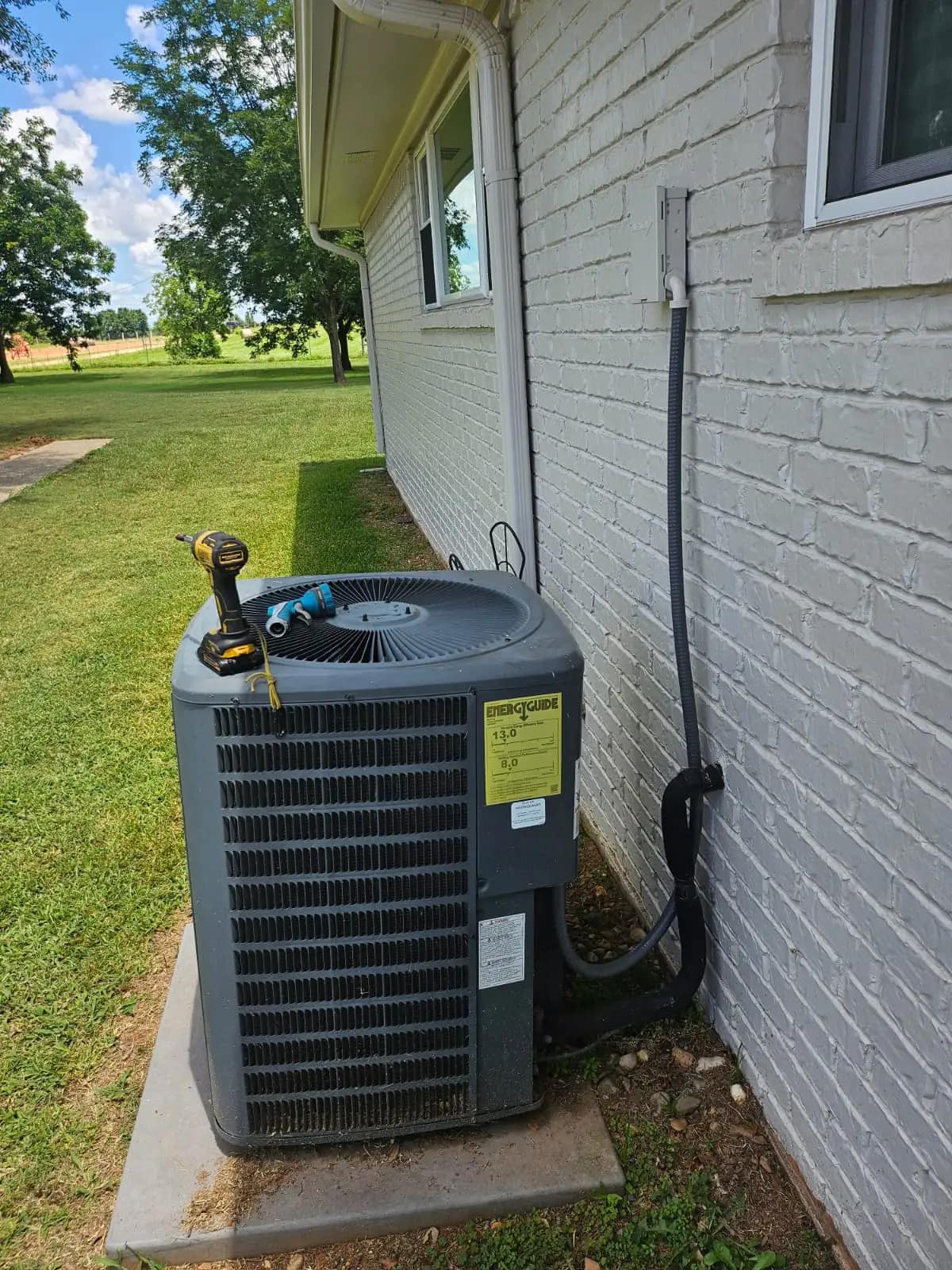Is your house starting to feel like a sauna? That dreaded moment when your AC won’t turn on can send shivers down your spine, especially during the sweltering heat of summer. It’s a frustrating experience, but before you panic and immediately dial an HVAC professional, there’s a lot you can investigate yourself. Many common AC issues can be resolved with a bit of DIY troubleshooting, saving you time, money, and a lot of sweat.
Why AC Won’t Turn On: Common Culprits
When your AC won’t turn on at all, it can feel like a mystery. However, most issues fall into a few key categories. Pinpointing the general area of the problem is the first step toward a solution.
Thermostat Troubles: The Brain of Your AC System
If your thermostat is not sending the right signals or if it’s experiencing a malfunction, your AC simply won’t know it’s supposed to start. A common scenario is when your AC won’t turn on but the heat will, which immediately points to a potential thermostat setting error or a problem specifically with the cooling function of the thermostat itself.
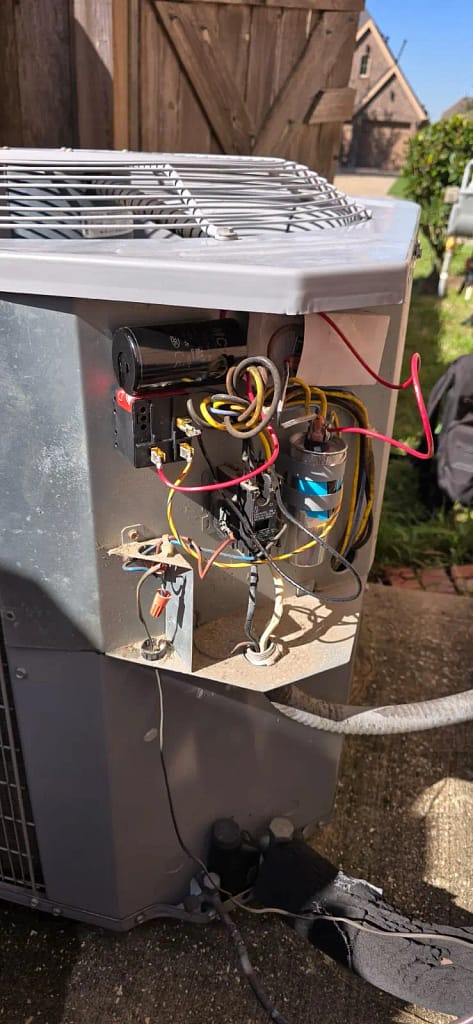
Electrical Issues: Powering Your Cool Air
Electricity is the lifeblood of your AC system. Without a steady supply, nothing will happen. Electrical problems are a frequent cause when your AC won’t work.
Airflow Obstructions: When Your AC Can’t Breathe
Your AC relies on a consistent flow of air to operate efficiently and safely. Blocked airflow can cause the unit to short-cycle, freeze up, or even prevent it from turning on as a safety measure.
Refrigerant Problems: The Lifeblood of Your AC
Refrigerant (often called Freon, though that’s a brand name) is the substance that absorbs heat from your home and releases it outside. Without the proper amount, your AC can’t cool your home effectively, and low levels can trigger safety cutoffs.
Mechanical Failures: When Components Break Down
Unfortunately, mechanical parts can wear out and fail over time. These are often more serious issues requiring professional intervention.
Whether your AC won’t turn on but the fan does or you’re facing another issue, 24SevenAC can handle it.
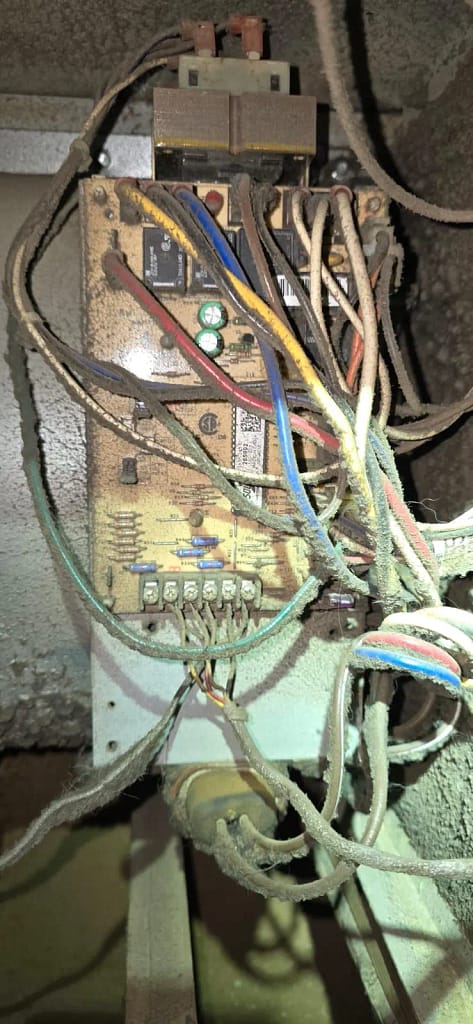
Step-by-Step DIY AC Troubleshooting Guide
Now that you understand the potential culprits, let’s get into the nitty-gritty of troubleshooting your AC won’t turn on.
Quick Checks You Can Do Yourself
Before you start digging deeper, tackle these simple checks:
- Check Your Thermostat:
- Ensure it’s set to “Cool” and the fan is on “Auto.”
- Lower the temperature setting by at least 5-10 degrees Fahrenheit below the current room temperature to trigger a cooling cycle.
- Check the batteries. Replace them even if you’re not sure they’re dead.
- If you have a smart thermostat, check its app for error codes or connectivity issues.
- Inspect the Circuit Breaker:
- Go to your electrical panel (usually in a basement, garage, or utility closet).
- Look for the breaker labeled for your “AC,” “Furnace,” or “HVAC.”
- If it’s tripped, it will be in the “off” position or somewhere in between “on” and “off.” Flip it completely to “off” and then firmly back to “on.”
- Wait a few minutes before trying to turn on your AC again. If it trips repeatedly, do not keep resetting it. This indicates a serious electrical problem that requires professional AC repair service.
- Look for a Drain Pan Switch:
- Many AC systems have a safety float switch in the condensate drain pan (located near your indoor unit). If the pan overflows due to a clog in the drain line, this switch will trip, shutting down the AC to prevent water damage.
- If the pan is full of water, carefully drain it and clear any visible clogs in the drain line (a shop vac can sometimes pull out the clog).
- Examine the Outdoor Unit (Condenser) If Your AC won’t Turn on:
- Check for any visible debris (leaves, branches, dirt) that might be blocking the fins. Clear it away carefully.
- Ensure the power disconnect switch (usually a small box near the outdoor unit) is in the “on” position.
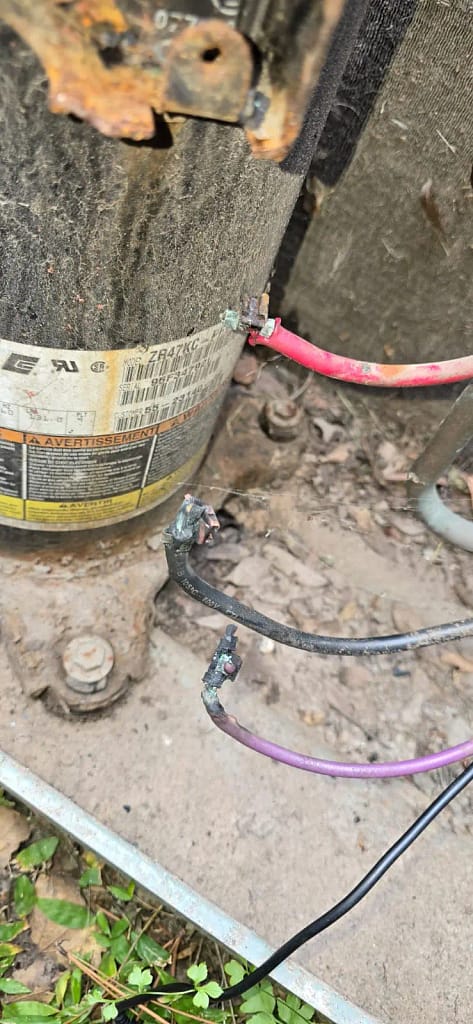
Investigating Airflow Problems
- Check and Replace Your Air Filter: This is paramount. Locate your air filter (usually in the return air vent, often in the ceiling, wall, or at the air handler/furnace). If it’s dirty, replace it with a clean one. A clean filter can make a world of difference, especially if your AC won’t turn on after winter and has been sitting unused with a clogged filter.
- Clear Around the Outdoor Unit: Make sure there are at least two feet of clear space around your outdoor condenser unit to allow for proper airflow. Trim back any plants or bushes.
Identifying Signs of Refrigerant Issues
Diagnosing a refrigerant leak is difficult without specialized tools, but there are some tell-tale signs:
- Hissing or Bubbling Noises: These can indicate a refrigerant leak.
- Ice on the Refrigerant Lines or Evaporator Coil: This is a strong indicator of low refrigerant or restricted airflow. If you see ice, turn off your AC immediately and let it thaw completely before calling a professional. Running an AC with ice can cause severe damage.
- Lack of Cold Air (if it turns on partially): If your AC blows air, but it’s not cold, it’s often a sign of low refrigerant. While this is different from the AC won’t turn on problem, users often search for it under the same umbrella.
Signs That Warrant a Professional HVAC Technician
While DIY troubleshooting can save you money, some issues simply require the expertise and specialized tools of a certified HVAC technician.
- Repeatedly Tripped Breaker
- Burning Smells or Smoke
- Loud, Unusual Noises
- Frozen Coils (after thawing)
- AC Makes a Hum, But Nothing Happens
- No Power Anywhere (despite the breaker being on)
So, if your AC smells bad, it might be time to call 24SevenAC.
The Importance of Professional AC Maintenance
Many of the issues that lead to your AC won’t turn on can be prevented with regular professional maintenance. Just like your car, your AC needs periodic tune-ups to operate efficiently and reliably. That’s where 24SevenAC comes in with professional solutions and well-planned AC maintenance.
Preventative Maintenance: Keeping Your AC Running Smoothly
An ounce of prevention is worth a pound of cure, especially when it comes to your AC. Regular maintenance can significantly extend the lifespan of your unit and help you avoid those sudden, unwelcome breakdowns.
Regular AC Tune-Ups and Inspections
Scheduling annual professional AC tune-ups, ideally in the spring before the peak cooling season, is one of the best investments you can make to solve your AC won’t turn on problem. During a tune-up, a technician will:
- Clean the coils (evaporator and condenser).
- Check refrigerant levels and inspect for leaks.
- Inspect electrical connections and components.
- Lubricate moving parts.
- Check the thermostat calibration.
- Inspect the condensate drain.
- Verify proper airflow and system operation.
These comprehensive checks can identify potential problems before they escalate into major failures, saving you from the headache of your AC won’t turn on scenario.
Simple Maintenance Tasks for Homeowners
Beyond professional tune-ups and AC maintenance service, there are simple tasks you can do yourself to keep your AC happy:
- Change Air Filters Regularly Every 1-3 Months
- Keep the Outdoor Unit Clean from Leaves, Grass Clippings, and Other Debris
- Ensure Clear Drainage
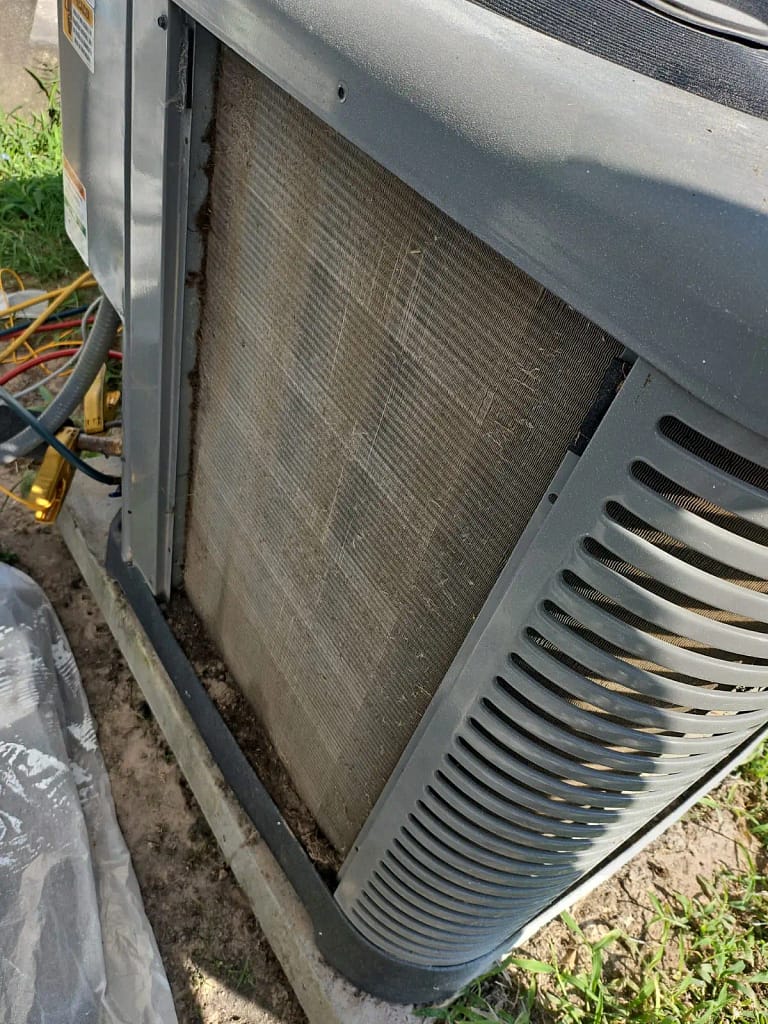
Specific Scenarios and FAQs
Let’s address some common specific situations that often lead people to exclaim, “My AC won’t turn on!”
My AC Makes a Hum, But Nothing Happens.
This is a classic sign of a bad capacitor. The capacitor stores and releases electrical energy to give the motors (especially the compressor and outdoor fan) the initial jolt they need to start. If it’s weak or failed, the motor will try to start (hence the hum) but won’t have enough power to fully engage. While a new capacitor is relatively inexpensive, replacing it involves handling high voltage and should be done by a professional unless you are experienced with electrical work.
My AC Trips the Breaker Repeatedly.
As mentioned, this points to a serious electrical issue or a motor (like the compressor or indoor blower motor) that’s drawing excessive current, indicating a fault within the component. Do not keep resetting the breaker. Continuously resetting it can damage your electrical system or even lead to a fire. Call a qualified HVAC technician immediately.
My AC Blows Air, But It’s Not Cold.
While this isn’t strictly an “AC won’t turn on” problem, it’s a common initial thought process for many users. If your AC is running and air is coming out of the vents, but it’s warm or only slightly cool, the most likely culprits are:
- Low Refrigerant
- Dirty Evaporator Coils
- Blocked Condensate Drain Line
- Dirty Air Filter
These issues often require professional diagnosis and repair.
My AC Worked Yesterday, But Not Today.
This sudden failure can be particularly frustrating. Common causes for an abrupt stop include:
- Tripped Circuit Breaker: This is the most frequent reason for a sudden shutdown.
- Thermostat Issue: Batteries died overnight, or settings were accidentally changed.
- Blown Fuse or Capacitor Failure: These components can fail without much warning.
- Safety Switch Trip: The condensate pan overflowed, or the unit overheated and tripped a safety sensor.
How Long Should an AC Unit Last?
The average lifespan of a well-maintained AC unit is typically 10 to 15 years, though some can last longer with excellent care, and others may fail sooner. Factors like climate, usage patterns, and regular maintenance significantly impact longevity. If your unit is approaching or exceeding this age and you’re facing significant repair costs, it might be more cost-effective in the long run to consider AC installation & replacement service. Modern AC units are significantly more energy-efficient, so a new system could also lead to substantial savings on your utility bills.
Choosing 24sevenac the Right Local HVAC Professional
When your DIY efforts fall short or the AC won’t turn on, the problem warrants expert intervention, and choosing the right HVAC professional is crucial. Don’t just pick the first name you find; do your homework. 24sevenac has a reputation for being a reputable and trusted company.
Questions to Ask Before Hiring an AC Technician
- Licensing and Insurance: Are they licensed and insured? This protects you in case of accidents or subpar work.
- Experience: How long have they been in business? Do they specialize in residential AC systems?
- Clear Pricing: Do they offer upfront pricing or provide a detailed estimate before any work begins? Beware of companies that offer vague quotes.
- Warranties: Do they offer warranties on their parts and labor?
- References/Reviews: Can they provide references, or do they have positive online reviews?
A reputable company, like 24sevenac, will be transparent about these details.
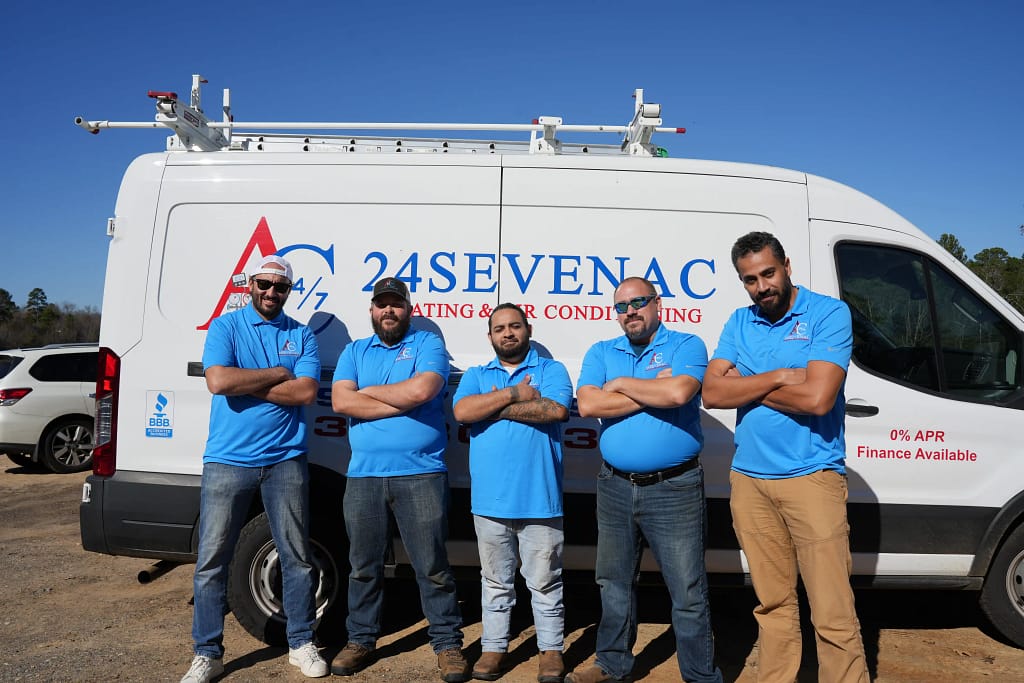
The Benefits of Regular Professional HVAC Maintenance
Scheduled service with 24SevenAC is a proactive approach to keeping your AC running smoothly. It not only helps prevent inconvenient breakdowns (like your AC won’t turn on in the middle of a heatwave) but also:
- Improves Energy Efficiency
- Extends Unit Lifespan
- Maintains Indoor Air Quality
- Ensures Warranty Compliance
Emergency AC Repair Services
Sometimes, your AC problem can’t wait. If your AC won’t turn on in your house in extreme heat, and it’s a health concern, 24SevenAC offers 24/7 emergency repair services. Don’t hesitate to call us when safety or extreme discomfort is at stake.
Conclusion
The sudden realization that your AC won’t turn on can be daunting, but as you’ve seen, it doesn’t always spell disaster. By systematically checking your thermostat, electrical panel, and the unit itself, you can often identify and resolve minor issues yourself. Remember the crucial role of airflow, the importance of a properly functioning thermostat, and the potential pitfalls of electrical problems.
However, recognizing when to call in a professional is just as important as knowing what you can fix yourself. For complex electrical issues, refrigerant problems, or major mechanical failures, the expertise of a certified HVAC technician is invaluable. Most importantly, consistent preventative maintenance is your best defense against the dreaded silent AC. A little proactive care goes a long way in ensuring your home remains a cool, comfortable oasis, even when the temperatures outside are soaring.

